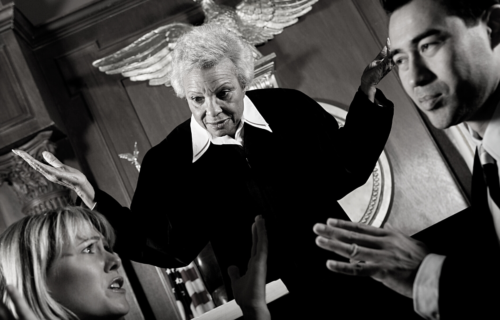
An Intimate Look Into Life With a High Conflict Personality
Today I have a special post for you today. A personal story written by a friend of mine who is a rock star survivor of marriage to and divorce from a high conflict person.
This kind of abuse is so often hidden among the “nice” families in our communities that it rarely gets shared. And yet it is a common theme that I hear from clients. They are exhausted – experiencing tremendous fear about leaving, drowning in court battles or nearly deaf from the verbal abuse.
Please accept this gift from a sister who understands.
“We want to be loved; failing that, admired; failing that, feared; failing that, hated and despised. At all costs we want to stir up some sort of feeling in others. Our soul abhors a vacuum. At all costs it longs for contact.” ― Hjalmar Söderberg, Doctor Glas
I’ve spent 25 years in a relationship with a High Conflict Personality; 1 engaged, 15 married, and 9 being a divorced co-parent with him. I was never able to get to the bottom of his downward spirals, until I read this quote recently. It’s an excellent description of the stages of his behavior. At his core, he does not feel loved (because he was abandoned as a child, but that’s a whole other story) so he demands admiration from his family and employees. When the admiration dims, he begins to use emotional, mental and verbal abuse to instill fear. Inevitably, those close to him begin to hate him and he is okay with that. He thrives on the fight. People who know him either love him or hate him; those in-between stages don’t last long. Our own son told a mutual friend the other day that his father is a very “polarizing” individual.
When you are in an intimate relationship with a HCP, it changes you. You learn to stuff your feelings. You learn to watch for and tamp down “triggers.” You learn to communicate in a very controlled manner, carefully thinking before you speak. You put yourself and your needs last. You hide your innermost thoughts and desires because they will likely be used against you at some point. You go into survival mode so that you don’t shatter. Your friends and family notice that you have become different somehow, a shell of a person.
It’s hard to describe but when you are the “victim” in this type of relationship, it makes you stronger and weaker simultaneously. Stronger in that you have become the most self-controlled version of you that you have ever been. Weaker in that you realize you have become as manipulative of their behavior as they have become of yours. Stronger in that you have successfully learned how to tiptoe through land mines. Weaker in that you are exhausted from walking on egg shells. Stronger in that you reach a point that you feel brave enough to leave. Weaker in that you can’t imagine how to live any other way.
The “aha” moment in my marriage was when I read a verse from another wonderful book. “There is no fear in love. But perfect love drives out fear, because fear has to do with punishment. The one who fears is not made perfect in love.” – I John 4:18 (NIV). I realized that what I had with my husband was not love at all. It was fear of him on my part and punishment of me on his part. It wasn’t real love at all. This realization gave me the strength and “permission” to leave the relationship.
Karen Covy, an Illinois divorce attorney and adviser, recommends five techniques for dealing with an HCP when you separate or divorce. I’ll attest to their effectiveness as well:
- Minimize contact. Avoid face to face interactions, and if it is unavoidable, do it in a public place or have someone with you.
- Communicate in writing. Use email. Protect yourself from the barrage of verbal abuse. You may still get it in written form, but it’s easier to turn off your computer than to turn off your ears.
- Establish rules. Get a separation agreement in writing as soon as possible so that the court can hold him/her accountable and relieve you of some of that need to control their behavior.
- Realize it’s not about you. Their anger and abuse may be directed at you, but it always stems from a deep-seeded issue they have with themselves.
- Don’t take the bait. The HCP wants to get a reaction from you. Don’t give them one. It’s actually very satisfying (and effective) when you learn to do this.
I am now 10 years separated and 9 years divorced. I’ve come a long way but am still healing. I continue to remind myself to set boundaries with HCPs. I still hide my feelings from most people. I have trust issues. I still carefully think before I speak. I still want to run when someone is angry and loud. I still don’t “self-care” as much as I should. But overall I am happy and I can sleep at night and I do not deal with blame, insults, name-calling, accusations and emotional abandonment on a daily basis anymore. I am better at the concept of letting “you be you” instead of feeling like I need to control others’ behaviors. I now recognize when someone else owes me an apology instead of feeling like I’m responsible for every hurt feeling. And the best part of all? The fear is gone.
♥ Anonymous

Navigating life with a HCP is difficult. Getting divorced from one and trying to co-parent can excruciating. You will need lots of support, new tools, and a renewed sense of self and strength to get to the other side. But, believe us, your mental health and your children’s well-being is worth it.
Schedule a complimentary consultation and let’s chat about the HCP in your life. Creating a proper exit strategy can go far in protecting you from some of the fallout. And personal support offers you the encouragement to keep going.
Wishing you strength and wisdom,




